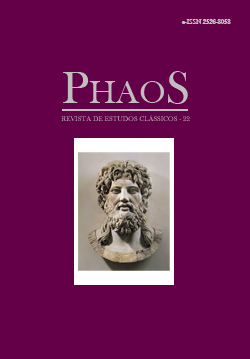Resumo
A matéria agrária das Geórgicas insere o segundo poema de Virgílio, composto em ca. 37-30 a.C., entre os textos técnicos latinos. Filiado à tradição hesiódica, o poema traz o tripé característico do gênero: o mestre, a matéria e o discípulo. Além disso, o momento histórico em que o poema foi composto é propício a rupturas na leitura linear da transmissão de uma matéria técnica. Ao final do Livro 1, o poema revela um mundo caótico, de guerras civis e assassinatos; o Livro 2 paradoxalmente provoca uma notável mudança de espírito: o mundo caótico dá lugar à alegria proporcionada por Baco e às colheitas fartas. Esse tratamento paradoxal parece provocar distensões nessa matéria e parece preparar o espaço para que Virgílio reflita sobre a Roma de seu tempo, do ponto de vista político e filosófico. A expressividade da linguagem poética é mais um fator que incide sobre as ambiguidades do poema, criando a imagem de que o campo dramatiza a existência humana.
Referências
GLARE, P. G. W. (Ed.) Oxford latin dictionary. 2.ed. Oxford: Clarendon Press, 2012. [OLD]
GRIMAL, P. Quelques aspects épicuriens des Géorgiques. Journal des savants. n. 1-2, 1980, p. 51-66.
HAGEN, H. Scholia Bernensia ad Vergili Bucolica atque Georgica. Lipsiae: Teubner, 1867. [Schol.Bern.]
HARDIE, P. Virgil’s Aeneid: cosmos and imperium. Oxford: Clarendon Press, 1986.
HENKEL, J. Vergil Talks Technique: Metapoetic Arboriculture in Georgics 2. Vergilius, v. 60, 2014, p. 33-66.
HOMERO. Ilíada. Tradução em verso de Carlos Alberto Nunes. Rio de Janeiro: Ediouro, 2001.
HOMERO.Odisséia. Tradução em verso de Carlos Alberto Nunes. Rio de Janeiro: Ediouro, 2002.
HORNBLOWER, S; SPAWFORTH, A.; EIDINOW, E. (Eds.). The Oxford classical dictionary. 4.ed. Oxford: University Press, 2012. [OCD]
LUCRÉCIO. Sobre a natureza das coisas. Trad. Rodrigo Tadeu Gonçalves. Belo Horizonte: Autêntica, 2021.
NAPPA, C. Reading after Actium: Vergil’s Georgics, Octavian and Rome. Michigan: Ann Arbor, 2005.
O’HARA, J. True names: Vergil and the alexandrian tradition of etymological wordplay. Ann Arbor, 1996.
PERKELL, C. The Poet’s truth: a study of the poet in Virgil’s Georgics. Berkley/ Los Angeles/ London: University California Press, 1989.
PERUTELLI, A. O textocomo professor. In CAVALLO, G.; FEDELI, P.; GIARDINA, A. O espaço literário da Roma Antiga. Trad. Daniel Peluci Carrara e Fernanda Messeder Moura. Belo Horizonte: Tessitura, 2010, p. 293-327.
PUTNAM, M. Virgil’s poem of the earth: studies in the Georgics. Princeton: University Press, 1979.
QUINT, D. Epic and empire: politics and generics form from Virgil to Milton. Princeton: University Press, 1993.
SKUTSCH, O. The Annals of Quintus Ennius. Edited with introduction and commentary. Oxford: Clarendon Press, 2003.
SMITH, A. R. In uino civitas: The Rehabilitation of Bacchus in Vergil’s Georgics. Vergilius, v. 53, 2007, p. 52-86.
TALBERT, R. J. A.; BAGNALL, R. S. et al. (Eds.) Barrington atlas of the Greek and Roman world. Princeton: University Press, 2000.
THOMAS, R. F. Reading Virgil and his texts: studies in intertextuality. Michigan: The University of Michigan Press, 1999.
THOMAS, R. F. Virgil and the Augustan reception. Cambridge: University Press, 2004.
THOMAS, R. F.; ZIOLKOWSKI, J. M. The Virgil encyclopedia. 3 vols. Blackwell: Wiley-Blackwell, 2014.
THESAURUS LINGUAE LATINAE. Leipzig: Teubner, 1900 –. [TLL]
TREVISAM, M. ‘Procedimentos retóricos e construção dos sentidos nas LaudesItaliae de Varrão e Virgílio’. In ASSUNÇÃO, T. R.; FLORES-JUNIOR, O.; MARTINHO, M. Ensaios de Retórica Antiga. Belo Horizonte: Tessitura, 2010.
THILO, G.; HAGEN, H. (Eds.). Servii grammatici qui feruntur in Vergilii carmina commentarii. 3 vols. Hildescheim: Olms, 1986.
VERGILIUS. Opera. With a commentary by John CONINGTON, v. I, containing the Eclogues and Georgics. 4ª Ed., revised with corrected orthography and additional notes and essays by Henry NETTLESHIP. London: Whittaker & Co., 1881.
VERGILIUS.Aeneis. Ed. Gian Biagio Conte.Teubner. Berlin: De Gryuter, 2005.
VERGILIUS.Bucolica et Georgica. Eds. Silvia Ottaviano et Gian Biagio Conte.Teubner. Berlin: De Gryuter, 2011.
VIRGIL.The Eclogues & Georgics. Ed. with introduction and notes by R. D.WILLIAMS. London: Bristol Classical Press, 2001.
VIRGIL. Aeneid 6: a commentary. v. 2. By Nicholas HORSFALL. Berlin: De Gruyter, 2013.
VIRGIL.Georgics. v. I (Books I-II). Cambridge Greek and Latin Classics. Text in Latin; commentary in English by R. F. THOMAS. Cambridge: University Press, 1990.
VIRGIL.Georgics. Edited with a Commentary by R. A. B. MYNORS. Oxford: Clarendon Press, 1994.

Este trabalho está licenciado sob uma licença Creative Commons Attribution-NonCommercial-ShareAlike 4.0 International License.
Copyright (c) 2022 Phaos: Revista de Estudos Clássicos


